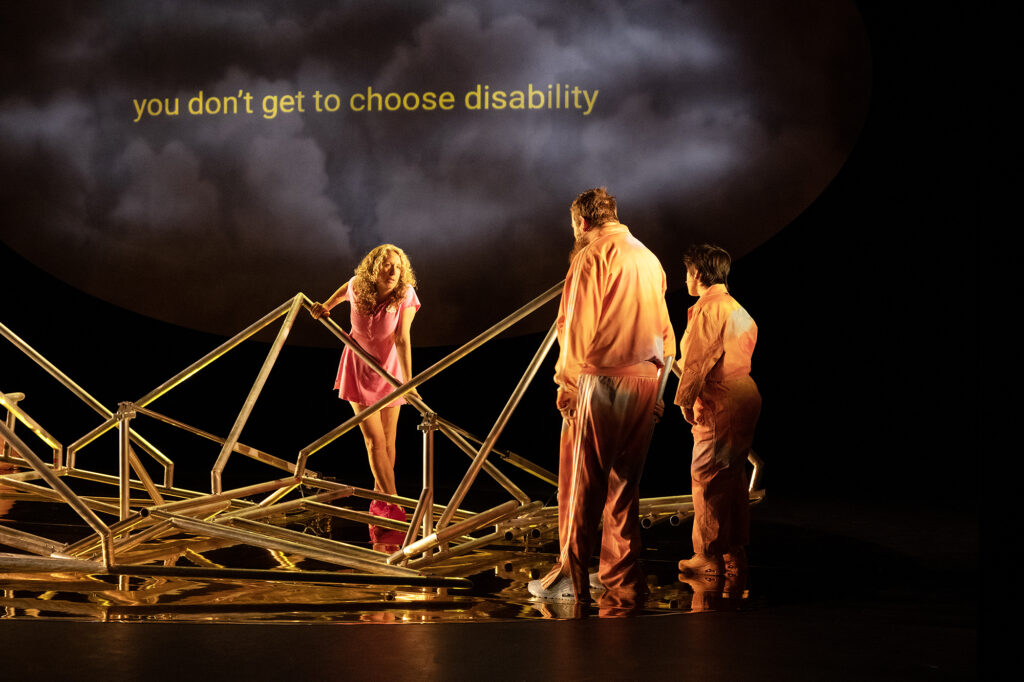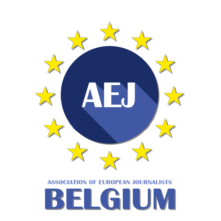By Gabriela López

Kunstenfestivaldesarts is a festival created to reunite French-speaking and Dutch-speaking communities in Brussels around art to stimulate dialogue and debate. In the framework of this festival, which takes place in different cultural spaces in Brussels from 10 May to 1 June, the Australian theatre company Back to Back presented Multiple bad things, a performance that was born as a response to various political and social problems.
In a troubled, fractured, divided and unempathetic world, working together has never been more difficult ,and at the same time, it has never been more important.
The company stages a situation in which a group of people have to work together to carry out a construction project. All members of the team have different degrees of involvement, all have particular difficulties, all are part of a ‘minority’.
The group of workers consists of a white cis-gender woman, an autistic man, a woman with reduced mobility and a man with Down’s syndrome. The play is between the attempt at collective work and the lateral violence that exclusion generates, even in a context that claims to be inclusive.
The play reflects on the violence of marginalization and invisibilisation, and on the exercise of power that rejection on a small or large scale entails. When it is said that freedom of expression is a fundamental value in the exercise of democracy, it also emphasizes the commitment to listen to other opinions and experiences.
Democratising speech means encouraging listening and multiplying spaces for encounters.
Kunstenfestivaldesarts proposes a meeting point between two regions that, historically, have had numerous disagreements. Language, culture, vision and politics are subjects of a certain division within the Royal Kingdom of Belgium. The scenario illustrated by Multiple Bad Things in its performance can easily be extrapolated to every individual and collective context, journalism included.
Diversity in the Belgian press: a good example?
Diversity has different faces: ethnic and cultural diversity, neurodivergence, disability, gender, language, political inclinations, etc. Among them, there are positions of power that, in many cases, individuals establish without realizing it. It is as if majorities were established within the minorities themselves.
Belgium is home to the capital of Europe. Brussels is the second most multicultural city in the world. Its media could well be proof of inclusion and equity, but unfortunately that is not the case. On the one hand, according to the fourth edition of the study on diversity and equality in the Belgian French-language daily press, published in March 2024, the proportion of diversity of origin in the daily media fell by six percent between 2013 and 2022, from 33 percent to 27 percent.
According to the same study, 0.02 percent of interviewees have a visible or named disability and only 21 percent of journalists are women. On the other hand, when it comes to public debates and media workers need an expert point of view it is frequent to see the same faces: commonly a white, privileged man of around 50 years old.
To counter this lack of diversity in expert consultation, the AJP (Association de Journalistes Professionnels) has created an inclusive database. Expertalia was created in 2016. The aim of this platform is to diversify the type of expert profile by including women, people from different backgrounds, young people, trans and non-binary people, people with disabilities, etc. Expertalia provides a database of 660 verified professionals. Guylaine Germain, Equality and Diversity Coordinator, points out that “to date, Expertalia has managed to ensure that 90 percent of its experts are women.
To date, Expertalia has around 800 registered users, which shows that the platform is being used by professional journalists and students alike. This database offers new routines for searching for information and an awareness that young people are in the process of appropriating”.
Another existing tool is The Brussels Binder, which is a network of Brussels-based women policy experts. This platform was also created to diversify the panel of intervenants in EU policy debates. The BB initiative reacts to the lack of ethnic and gender diversity in European institutions and their allies.
Multiple bad things reopen an uncomfortable but indispensable debate to strengthen freedom of the press and freedom of expression (for all). Expertalia, as well as The Brussels Binder, proposes a tool designed to give journalists access to different narratives and professional points of view when they need to resort to an external source, one in the local bubble and the other one in an EU level. AEJ invites journalists to encourage this debate and to use existing tools to continue reporting from an increasingly inclusive perspective.
